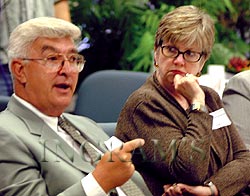by Dr. Dan Radakovich
Dr. Dan Radakovic Radakovich is Executive Vice President of Academic Affairs at Johnson County Community College. He may be reached by phone at 913-469-8500 or by e-mail at dradak@jccc.net. Dr. Wayne Giles, Chancellor of the Metropolitan Community Colleges, and Dr. Thomas Burke, President of the Kansas City Kansas Community College, also contributed to this article.

The Kansas City metropolitan area has three community college districts serving nearly 100,000 students in continuing education and credit courses each semester. The Metropolitan Community College District on the Missouri side and Kansas City Kansas Community College and Johnson County Community College in Kansas, like community colleges nationwide, focus on three main mission statements: lower-division transfer education leading to completion of a baccalaureate degree at a four-year college or university, career education leading to initial employment, and work-force training at all levels. All three community colleges strive to have their students succeed and all three know that for that vision to be realized, partnerships must be established with the K-12 districts that they serve, the area colleges and universities, and area employers.
Relationships with the Colleges and Universities
The transfer function can only work if two things happen. The courses offered by the community colleges must be clearly articulated with the receiving institution, and a trust must be established that insures course-competency expectation is the same at all institutions. Approximately 20 percent of the high-school seniors who go on to postsecondary education start at the community college; a far higher percentage of African American and Hispanic students attend community colleges first. About 40 percent of those students who start at the community college and who declare that their goal is to transfer to a four-year school to earn a baccalaureate do so within five years. The vast majority of those students transfer after three semesters at the community college. Transfer works well.
The four-year colleges and universities have also recognized that the community colleges can be great partners in helping them serve the greater Kansas City area. Several new baccalaureate programs have been established to serve this community with the community colleges providing the lower-division curriculum and the universities providing the upper-division courses for degree completion. For example, in keeping with Kansas City's effort to become a center for the biosciences, the University of Kansas and Johnson County Community College have just initiated a molecular-biology degree to meet the expected need for trained individuals in that field. This is but one example of the cooperative effort between two- and four-year colleges and universities in this area; there are many more.
Relationships with Business and Industry
The three area community colleges work together to offer career programs to meet the manpower needs of local business, industry, health care, and governmental employers. The community colleges offer over 70 career programs developed with the help of advisory councils staffed by the industry experts who employ our graduates. Most of the programs also seek outside program accreditation to help assure quality control; many also require state-level testing for licensure or industry testing for certification.
In addition to the associate-degree and certificate-career programs offered, the community colleges all have centers for business and technology training to serve the continuing education needs of the Kansas City work force. These centers provide contract training for specific entities, short-term training, testing and certification in areas ranging from supervisory training to technical skill training to English as a Second Language, to name a few. If there is a need, the colleges will work to fill it. Some of the community colleges have established Small Business Development Centers to help people get into business, and all cooperate with state agencies to help new and expanding industry access the various state funds available to encourage economic development.